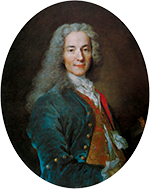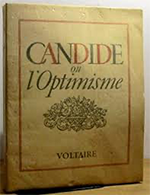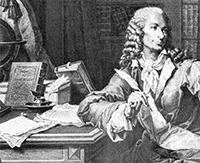Voltaire: French Champion of Wit, Liberty
Voltaire was one of France's most famous thinkers and writers. A worldwide sensation, he produced books, plays, and pamphlets on subjects far and wide. A champion of individual liberty, he was often at odds with authorities, despite his fame. 
He was born François-Marie Arouet on Nov. 21, 1694, in Paris. When he was 10, he went to the Collége Louis-le-Grand, a Jesuit school in Paris, to get a classical education. He developed a love for literature and the theater and also developed skill as a writer. He pursued this as a career, rather than the law, which his father had preferred. Once he started setting quill to paper, he seemingly didn't stop. Sources say that he wrote more than 2,000 books and pamphlets and more than 20,000 letters. In his earliest days of publication, he was a playwright, penning an adaptation of Oedipus Rex, originated by the ancient Greek tragedian Sophocles; Voltaire's version, Oedipe, appeared in 1718. This play was successful, and he started using his pen name, Voltaire, which he had come up with while serving time in prison. Other of his well-known plays were these:
In his early days of writing plays, he published the long epic poem La Henriade, celebrating King Henry IV. It was a big hit and endeared him to many French nobles, particularly the regent, the Duke of Orleans, and Louis XV's queen, Marie Leszcyńska, and found himself named court poet. An emboldened Voltaire used his newfound fame and influence to espouse the Deism and other anti-authority beliefs for which he was famous. Like other philosophes, he embraced the maxim of Descartes that skepticism was a healthy way to look at the world. Indeed, one of his most famous sayings was "Doubt is not a very agreeable state, but certainty is a ridiculous one." Voltaire was fond of uttering and/or writing epigrams, many of which showed off his razor-sharp wit and targeted figures in authority:
Two of his well-known later writings were histories, The Age of Louis XIV (1751) and Essay on the Customs and the Spirit of the Nations (1756). (He had two decades before penned Hisoire de Charles XII, a biography of the Swedish king. 
It was at this time that Voltaire was also publishing works of philosophy. In 1734, he published Lettres philosophiques, a set of fictional letters that effectively contrasted English and French philosophical traditions. To the short stories Vision de Babouc (1748), Micromégas (1752), and Plato's Dream (1756) he added Candide (1759), one of the most well-known of all Enlightenment works. The pessimistic satire (with its famous Doctor Pangloss seeing "the best of all possible worlds") is a sendup of many things philosophical and religious and brought Voltaire great fame, both in his own lifetime and afterward. Capping his philosophical publications was the Dictionnaire philosophique (1764), a dictionary-encyclopedia hybrid that exemplified the ideas of the Enlightenment, at times at the expense of those of the Catholic Church. Voltaire probably would have been punished by the Church and/or the Crown if he had been in France when he published his philosophical dictionary. As it happened, he had moved to Prussia in 1750 and had lived there and elsewhere in Europe since then. He had an acerbic wit and seemingly delighted in needling authority figures. Yet he also said, "A witty saying proves nothing." All the same, what he published or said publicly got him into trouble at times. He had been exiled or otherwise punished for earlier writings and actions, including a stint in the Bastille on charges of libeling officials, the king's regent among them, with his poetry. In fact, Voltaire spent nearly as much of his life outside Paris itself and France in general than he did within French borders and certainly in the capital. In 1733, he published Letters on the English, which so angered both Church and Crown that he was compelled to flee the capital and go almost into hiding. He had spent a busy two years in England before that, mixing with the playwright William Congreve and the prose writers Alexander Pope and Jonathan Swift. He found himself enamored of the power of Shakespearean drama. He learned English so he could read John Locke in his native language, and he embraced the scientific thought and writings of Isaac Newton, whose discoveries he later shared with the French public in Éléments de la philosophie de Newton (1738). 
In his later years, an angry Voltaire condemned the vicious punishments doled out by the government, issuing the clarion call for people who were similarly disillusioned to "Crush the infamous thing!" His fame was such that he could get away with writing such things. Above all, he believed in religious tolerance as an extension of the fundamental rights of man. He returned to Paris on Feb. 10, 1778, having spent nearly 30 years away. Ostensibly returning to direct his new play Iréne, he nonetheless had plenty of time to catch up with all of the people who came to visit. He was such a celebrity by this time that his name was known around Europe and in America. He was in the habit of corresponding or visiting with heads of state and other famous people, and this continued to the last days of his life. His triumphant return to his beloved Paris was short-lived. He died of kidney failure on May 30 of the year that he returned; he was 83. Famous quotes by Voltaire:
|
|
Social Studies for Kids
copyright 2002–2026
David White




